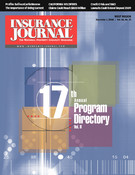With incoming President-elect Barack Obama and major increases in the U.S. House of Representatives and the Senate, the Democrats will now control both chambers of Congress and the White House. The changing of the political guard, coupled with the recent turmoil in the financial markets that includes the rescue of AIG, will undoubtedly mean that the insurance industry will experience unprecedented scrutiny at the federal level. Several areas are especially on the radar for 2009.
Federal Regulation: The recent rescue of AIG and additional insurer access to the Treasury Department’s TARP funds is sure to increase the focus on insurance regulation and potential reforms. Remaining on the table for the time being is the “optional” federal charter (OFC) proposal, which may have lost its window of opportunity. The Big “I” believes that a deregulatory proposal such as OFC is going to be a tough sell in these new economic and political circumstances. This Congress will be moving toward more regulation, not regulatory arbitrage, which is what an OFC would create. As Congress considers a restructuring of the financial services regulatory system in the 111th Congress, the Big “I” will advocate on behalf of its members and guard against negative consequences for independent insurance agents and brokers.
Targeted Regulatory Reform: The Big “I” will continue to support targeted regulatory reform, such as the surplus lines legislation and agent licensing reform (NARAB II). The House passed both pieces of legislation overwhelmingly during the 110th Congress, and our association hopes there will be continued momentum on this topic in both the House and Senate in the next Congress.
NARAB II, in particular, would provide great benefit for independent insurance agents and the customers they serve.
Natural Disaster Insurance: President-elect Obama will be the first U.S. president in history to have included specific language in his campaign platform calling for the creation of a natural disaster insurance fund. The election results mean the prospects for passage of some sort of federal backstop for natural disasters has improved. With that said, it is important to note that when it comes to the issue of natural disaster insurance, the political camps are not typically partisan but instead fall along geographic divides. The divisions within the insurance industry also still need to be overcome.
Flood Insurance: The Big “I” will push for an extension of the National Flood Insurance Program (NFIP), which is set to expire on March 6, 2009. The Big “I” is also advocating for certain reforms that would improve the program for consumers — most importantly, inclusion of optional business interruption and additional living expenses coverage.
Taxes: Tax issues were a primary focus of the presidential campaign, and President-Elect Obama’s tax plan would raise taxes for independent agencies in a variety of ways: Many subchapter S corporations, which pay individual tax rates, would see tax increases; the capital gains rate would be higher for many; Social Security payroll taxes would go up for higher paid employees; and estate taxes would increase from current law. The Big “I” will work to ensure fair tax treatment for independent agencies.
The new political dynamic in Washington undoubtedly has the potential to shake things up in our industry. As our country attempts to address the financial crisis in the coming months, it is even more imperative that the insurance industry work together to protect consumers and continue to ensure that our piece of the financial services puzzle is secure. The Big “I” is up to the task and will continue to work with others in the marketplace to protect policyholders and ensure that they have accessible to the insurance coverage they need.
Was this article valuable?
Here are more articles you may enjoy.


 How One Fla. Insurance Agent Allegedly Used Another’s License to Swipe Commissions
How One Fla. Insurance Agent Allegedly Used Another’s License to Swipe Commissions  Allstate CEO Wilson Takes on Affordability Issue During Earnings Call
Allstate CEO Wilson Takes on Affordability Issue During Earnings Call  Portugal Deadly Floods Force Evacuations, Collapse Main Highway
Portugal Deadly Floods Force Evacuations, Collapse Main Highway  Insurance Issue Leaves Some Players Off World Baseball Classic Rosters
Insurance Issue Leaves Some Players Off World Baseball Classic Rosters 


